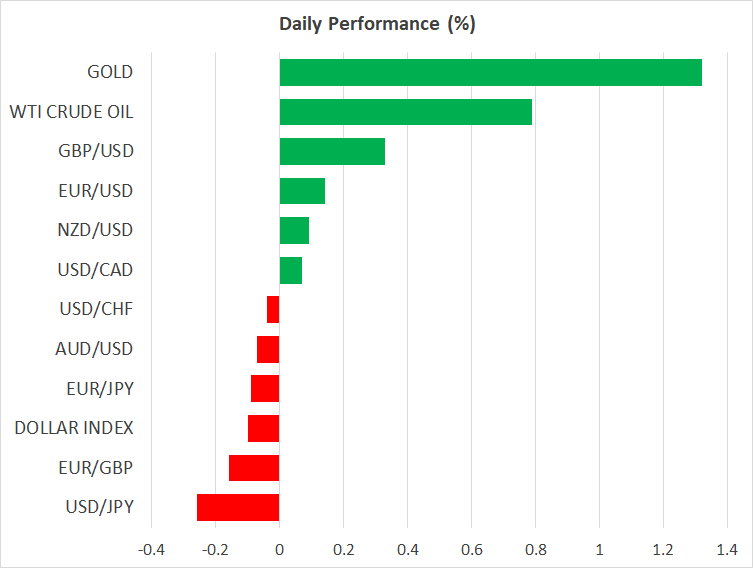- US stock market hits new record after Pfizer vaccine announcement
- Crude oil and commodity currencies soar, yen crumbles alongside gold
- However, the party doesn’t last – stocks give up most gains, dollar reverses higher
- RBNZ meeting coming up, vaccine and stimulus news remain in focus

Pfizer vaccine news catapult markets to new records
Christmas came early for investors this year, with global equities charging higher and safe havens falling apart after drug maker Pfizer announced that the coronavirus vaccine it is developing was more than 90% effective in preventing infection during late-stage trials. The news naturally fueled hopes for a return to ‘normalcy’ next year, sparking a classic risk-on market reaction.
Defensive assets such as gold and government bonds suffered, while riskier plays like stocks and crude oil thrived as investors finally saw the light at the end of the covid tunnel. The S&P 500 exploded higher to reach a new record peak, but that doesn’t tell the whole story, as there was a tremendous rotation within the stock market away from stay-at-home tech winners and towards the most beaten-down value and small cap names.
It was a similar story in the currency sphere. The yen collapsed alongside the Swiss franc as traders trimmed their safe-haven exposure, while commodity-linked currencies such as the loonie and kiwi shot higher. This is how the session started, not how it ended. As the North American session progressed, the incredible euphoria started to fade and some of these trades rolled over, with the S&P 500 for instance surrendering most of its gains.
Did the bond market ruin the party?
There was no clear catalyst behind this reversal, but there are several reasonable explanations. It could have been the realization that there are still several hurdles before this vaccine is approved and widely distributed, or the news that Trump is pushing ahead with his legal fight, or perhaps just a simple case of profit-taking after a monster rally.
However, none of these seem significant enough to ignite such a drastic reversal. Rather, investors may have realized that a vaccine means smaller stimulus doses from governments and central banks in the coming months and years.
It all comes back to the bond market. Expectations for a stronger recovery imply the Fed might take its foot off the accelerator soon, which diminishes demand for government bonds and pushes Treasury yields higher. Higher bond yields in turn make everything else less attractive, as the current stock market valuation wouldn’t make sense in a world of higher interest rates.
In other words, the sharp spike higher in Treasury yields may have ‘broken’ the stock market’s rally, and in the process brought the dollar back to life. This also explains why the yen and gold were devastated so dramatically and did not really recover even as stocks retraced, as both assets tend to suffer the more interest rates rise.
RBNZ in focus, stimulus guessing game resumes
Things are calmer on Tuesday and the question now is whether this tidal wave of optimism can continue or whether the good news have been priced in already. The answer may lie with what signals we receive from Congress and the Fed about more imminent stimulus, and how infection numbers evolve from here.
Overall, with the world flush in liquidity and cheap money likely to remain the dominant force in this market, it is difficult to argue for any significant setbacks.
Finally, the Reserve Bank of New Zealand will wrap up its policy meeting at 01:00 GMT Wednesday. Economic data have improved lately, but the Bank could stress that the risks remain to the downside and reaffirm that negative rates are still on the menu. If anything, such signals may weigh on the kiwi slightly, but the currency’s broader fate remains at the hands of global risk sentiment.

